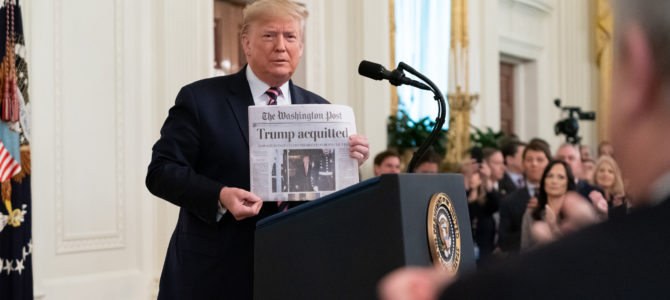Former President Donald Trump demanded that the Pulitzer Prizes staff immediately revoke the award granted to The New York Times and The Washington Post in 2018 for their Russia hoax reporting, which he said “was based on false reporting of a non-existent link between the Kremlin and the Trump Campaign.”
In the letter, Trump pushed the Pulitzer Prizes’ interim administrator Bud Kliment to admit that the corporate media’s coverage of Russiagate was “no more than a politically motivated farce which attempted to spin a false narrative that my campaign supposedly colluded with Russia despite a complete lack of evidence underpinning this allegation.”
Trump noted that the Pulitzer board not only overlooked the falsities and deceptions woven into these stories but praised the “sensational headlines” that “leaned heavily on unsubstantiated anonymous sources.”
“As a result, the public was deprived of an independent means of assessing their credibility, their potential for political bias, and the source of their knowledge,” Trump wrote. “For two years, these institutions feverishly pushed one Russia story after another and – despite lacking any credible evidence – attempted to persuade the public that my campaign had colluded with the Russian government.”
Even when conservative media such as The Federalist “questioned the legitimacy of these reports, exposing the clear logical fallacies contained in their narratives and pointing to the clear lack of evidence underpinning them,” Trump said the public was misled to believe that he colluded with Russians.
Trump noted that not only were these allegations confirmed to be false, but the recent indictment of Hillary Clinton’s campaign attorney, Michael Sussmann, “serves as a damning repudiation of the media’s obsession with the collusion story.”
The former president maintains that the Pulitzer Prize “has been widely recognized as a significant achievement in the field of journalism” even though it was awarded to Nikole Hannah-Jones’s “1619 Project,” which The New York Times begrudgingly modified after scholars noted it contained historical inaccuracies.
“It has been viewed by many as an honor that is meant to be bestowed upon well-deserving recipients in recognition of their groundbreaking journalistic efforts. This level of reverence carries with it a very important connotation, namely that the reporting itself is inherently deemed credible, well-sourced and trustworthy. Given this powerful presumption, there is a heavy burden to ensure that these works are continuously and closely examined as to the veracity of the information contained therein. When it becomes apparent that a Pulitzer Prize-winning work was based on shoddy, dubious and manifestly false reporting – as is the case here – the Pulitzer Prize Board must react accordingly,” he wrote.
Trump said he hopes corporate media outlets will surrender their Pulitzer Prize for National Reporting but said the organization should take the award back if not.
“Without holding the recipients to such a high standard of accountability, the integrity of the Pulitzer Prize namesake stands to be wholly compromised,” Trump concluded.








